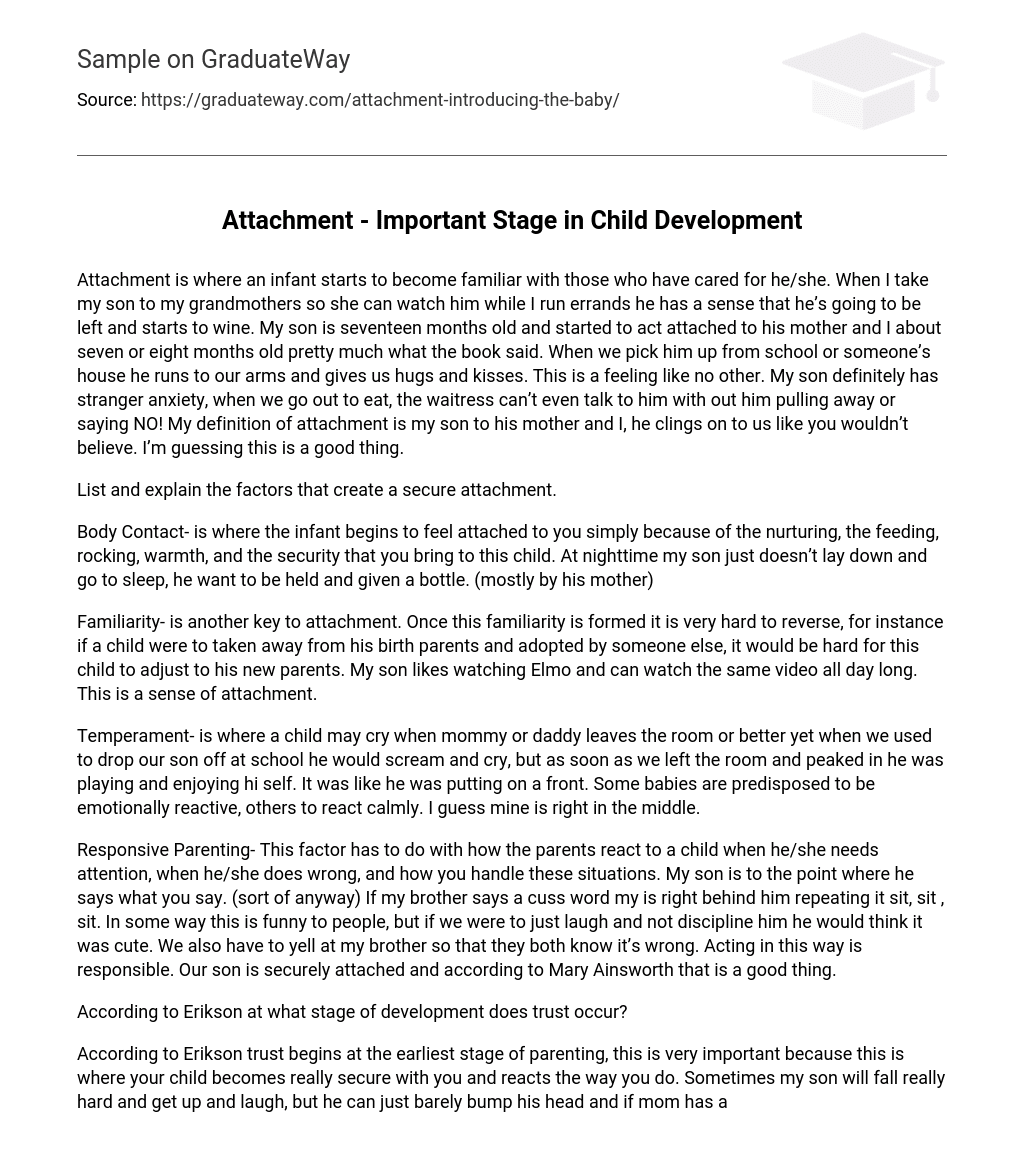Attachment is the process through which an infant forms a connection and bonds with their caregivers. When I leave my son with my grandmother to babysit while I run errands, he begins to sense that he will be separated from us and starts whining. This behavior began when he was about seven or eight months old, just as the book described. Whenever we pick him up from school or someone’s house, he eagerly runs towards us, showering us with hugs and kisses. The feeling this gives me is beyond words. It is evident that my son experiences stranger anxiety — even waitresses who attempt to engage with him are met with a firm “NO!”. In my view, attachment is the profound bond my son shares with his mother and myself; he clings to us in a way that is truly extraordinary. I see this as something positive.
The secure attachment can be created by listing and explaining the factors that contribute to it.
The concept of Body Contact involves the infant developing a sense of attachment to the caregiver due to the nurturing, feeding, rocking, warmth, and security provided. During nighttime, my son doesn’t simply lie down and fall asleep; he desires to be held and given a bottle, mostly by his mother.
Attachment is deeply connected to familiarity, which can be challenging to alter once established. For instance, when a child is placed with adoptive parents after being separated from their biological ones, adjusting to the new caregivers can prove difficult. This same sense of attachment is evident in my son’s strong connection to Elmo; he happily watches the same video multiple times daily.
Temperament, which is a child’s reaction to specific situations, can vary greatly. For instance, when a parent departs from the room, certain children may respond by crying. This conduct was witnessed in our own son during school drop-off: at first, he would scream and cry. Nevertheless, upon checking on him later, we would find him contentedly engaged in play as if he had merely feigned distress. Each infant possesses their distinct temperament; some exhibit heightened emotional reactivity while others maintain composure. In our particular situation, our baby’s temperament falls somewhere intermediate.
Responsive Parenting refers to how parents respond to their child’s needs for attention and inappropriate behavior, as well as how they handle these situations. Currently, my son is in the stage of imitating others to some extent. For instance, if my brother uses a swear word, my son quickly repeats it (“sit, sit, sit”). While this may be amusing for some people, it is crucial for us not only to find it funny but also to discipline him; otherwise, he will perceive it as adorable. Additionally, we need to reprimand my brother so that both he and our son understand that using such language is not acceptable. By behaving in this manner, we are demonstrating responsible parenting. It is important to note that our son has developed a secure attachment with us, which corresponds with Mary Ainsworth’s research on positive child-parent relationships.
What stage of development does trust occur according to Erikson?
Erikson stresses the importance of trust in the early stages of parenting for forming a secure connection between child and caregiver. I have noticed that my son can easily recover from big falls with laughter, but even a small bump on his head can lead to tears if he perceives a negative response from his mother.
Why is this stage in development significant?
The connection formed between you and your child during this stage will have a lasting effect on your relationship. As the French say, the lessons learned in infancy leave an enduring imprint on us.
When a child is abused, what happens to the attachment?
Child abuse can cause lasting damage and have long-term consequences for the victim. The memories of trauma resulting from sexual or physical abuse can resemble those portrayed in movies. Moreover, ongoing abuse diminishes a child’s feeling of connection, leading them to adopt harmful coping strategies like excessive eating, drinking, or drug use.
How does building trust during childhood relate to intimacy in adulthood?
The connection between attachment in early years and intimacy in adulthood revolves around the longing for closeness and safety. During childhood, the main focus is on seeking attachment to feel secure. As one grows into adulthood, there is a shift towards pursuing emotional closeness through intimacy. However, I personally tend to avoid getting too close to others because I prefer not having more children!





